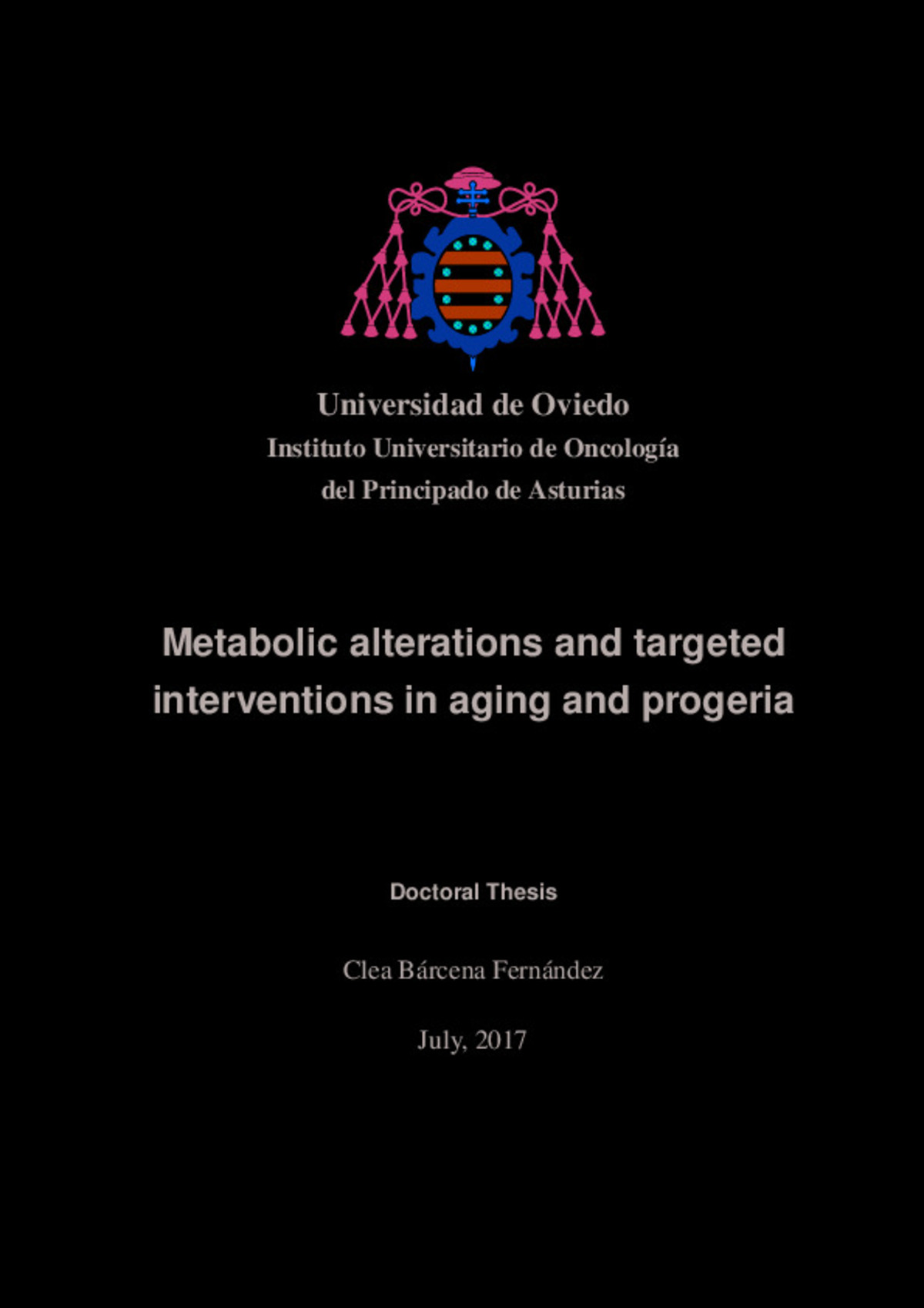Alteraciones metabólicas e intervenciones dirigidas en envejecimiento y progeria
Autor(es) y otros:
Director(es):
Centro/Departamento/Otros:
Palabra(s) clave:
Biología molecular y celular
Fecha de publicación:
Descripción física:
Resumen:
The loss of quality of life that involves aging, an unavoidable biological phenomenon that increases the probability of illness and vulnerability to death, endows the study of its underlying mechanistic causes with great importance. Interestingly, the molecular alterations associated with aging carry along a loss of the metabolic equilibrium of organisms, suggesting an intimate relation between aging and metabolism whose molecular insights remain to be fully elucidated. In this Thesis we have aimed to deep in the genetic, cellular and molecular causes of aging from a metabolic point of view. Thus, we have identified a novel mutation in PIK3R1 as the genetic cause of an aggressive form of Short syndrome and we have successfully used nuclear abnormalities as an efficient readout to study chemical compounds that could efficiently improve progeroid features. Moreover, we have successfully explored the effect of dietary methionine restriction in murine models of accelerating aging, observing an amelioration of transcriptional and metabolic features and an extension of healthspan and lifespan. Also, we have characterized the gut microbiome of aging and proved that its external manipulation can positively affect longevity, therefore opening the path towards microbiome-based therapies against age-related pathologies. El envejecimiento es un fenómeno biológico aparentemente inevitable que implica la pérdida de calidad de vida. Curiosamente, las alteraciones moleculares asociadas al mismo conllevan una pérdida del equilibrio metabólico, sugiriendo una íntima relación entre envejecimiento y metabolismo cuyo trasfondo molecular aún se desconoce. En esta Tesis hemos querido ahondar en las causas genéticas, celulares y moleculares del envejecimiento desde un punto de vista metabólico. Así, hemos identificado una nueva mutación en PIK3R1 como la causa genética de una forma severa de síndrome de Short y hemos utilizado la cuantificación de anormalidades nucleares para identificar compuestos químicos que puedan mejorar las características de la progeria. Además, hemos explorado el efecto de la restricción en metionina en modelos murinos de envejecimiento acelerado, observando una mejora de las alteraciones transcripcionales y metabólicas, así como un aumento en la supervivencia. También hemos caracterizado el microbioma intestinal del envejecimiento, mostrando que su manipulación tiene un efecto positivo sobre la longevidad y sentando las bases para futuras terapias basadas en la modificación del microbioma contra patologías relacionadas con el envejecimiento.
The loss of quality of life that involves aging, an unavoidable biological phenomenon that increases the probability of illness and vulnerability to death, endows the study of its underlying mechanistic causes with great importance. Interestingly, the molecular alterations associated with aging carry along a loss of the metabolic equilibrium of organisms, suggesting an intimate relation between aging and metabolism whose molecular insights remain to be fully elucidated. In this Thesis we have aimed to deep in the genetic, cellular and molecular causes of aging from a metabolic point of view. Thus, we have identified a novel mutation in PIK3R1 as the genetic cause of an aggressive form of Short syndrome and we have successfully used nuclear abnormalities as an efficient readout to study chemical compounds that could efficiently improve progeroid features. Moreover, we have successfully explored the effect of dietary methionine restriction in murine models of accelerating aging, observing an amelioration of transcriptional and metabolic features and an extension of healthspan and lifespan. Also, we have characterized the gut microbiome of aging and proved that its external manipulation can positively affect longevity, therefore opening the path towards microbiome-based therapies against age-related pathologies. El envejecimiento es un fenómeno biológico aparentemente inevitable que implica la pérdida de calidad de vida. Curiosamente, las alteraciones moleculares asociadas al mismo conllevan una pérdida del equilibrio metabólico, sugiriendo una íntima relación entre envejecimiento y metabolismo cuyo trasfondo molecular aún se desconoce. En esta Tesis hemos querido ahondar en las causas genéticas, celulares y moleculares del envejecimiento desde un punto de vista metabólico. Así, hemos identificado una nueva mutación en PIK3R1 como la causa genética de una forma severa de síndrome de Short y hemos utilizado la cuantificación de anormalidades nucleares para identificar compuestos químicos que puedan mejorar las características de la progeria. Además, hemos explorado el efecto de la restricción en metionina en modelos murinos de envejecimiento acelerado, observando una mejora de las alteraciones transcripcionales y metabólicas, así como un aumento en la supervivencia. También hemos caracterizado el microbioma intestinal del envejecimiento, mostrando que su manipulación tiene un efecto positivo sobre la longevidad y sentando las bases para futuras terapias basadas en la modificación del microbioma contra patologías relacionadas con el envejecimiento.
Notas Locales:
DT(SE) 2017-235
Colecciones
- Tesis [7669]
Ficheros en el ítem




